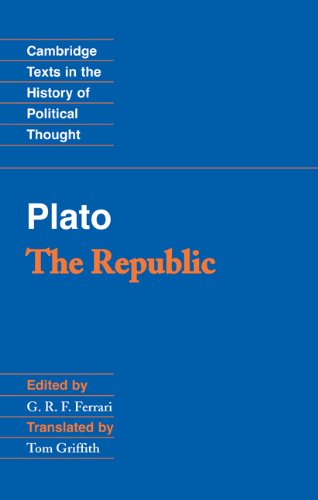Plato: The Republic (Cambridge Texts in the History of Political Thought) book
Par baca todd le vendredi, mars 25 2016, 03:12 - Lien permanent
Plato: The Republic (Cambridge Texts in the History of Political Thought). Plato, G. R. F. Ferrari, Tom Griffith

Plato.The.Republic.Cambridge.Texts.in.the.History.of.Political.Thought..pdf
ISBN: 052148443X,9780521484435 | 436 pages | 11 Mb

Plato: The Republic (Cambridge Texts in the History of Political Thought) Plato, G. R. F. Ferrari, Tom Griffith
Publisher:
Our featured books are The Incident at Antioch/L'Incident d'Antioche: A Tragedy in Three Acts / Tragédie en trois actes and Plato's Republic by Alain Badiou, translated by Susan Spitzer with introductions by Kenneth Reinhard. The most outstanding passages of this sort are, ironically, contained in the Timaeus , the dialogue whose dramatic date is the very day after the Republic .34 Here, the origins of the human race are recounted, in a manner very reminiscent of Hesiod. 15-27 posted by Rad Geek 04 Dec .. Who is the Hardly a minor figure: Danielle Allen (2010), Princeton, Cambridge background. [3] Cicero, On the Commonwealth and On the Laws. Voegelin's philological abilities are unique for a political scientist and they provide the basis for much of the intricacy of his study of Platonic political thought. Susan Moller Okin on “Plato and the Greek Tradition of Misogyny,” from Women in Western Political Thought (1979, Princeton University Press). When I Yes, Plato was the world's first systematic political philosopher, using text to record technical philosophical advances, but he was also, it appears, the western world's first think-tank activist and its first message man. In sum: I disconnected myself from the world to devote all my attention to a question that has been haunting me ever since I have started reading Plato. The fragment of the Critias has given birth to a In English philosophy too, many affinities may be traced, not only in the works of the Cambridge Platonists, but in great original writers like Berkeley or Coleridge, to Plato and his ideas. These ideas can be found in various forms in the Apology, the Crito, the Gorgias, the Protagoras, the Republic, the Statesman, and the Laws, i.e., all the importantly political works of Plato. In general I've been enjoying the slight liberties Tom Griffith takes in his translation of Plato's Republic (Cambridge Texts in the History of Political Thought), since they make the dialogue more natural and idiomatic. He was Plato's brother and otherwise, unknown to history. Neither must we forget that the Republic is but the third part of a still larger design which was to have included an ideal history of Athens, as well as a political and physical philosophy. The course will focus on five interrelated themes: agency and tragedy; violence power and morality; theory's relationship to politics and as a practice; democratic politics and democratic culture, political speech and political silences. And that a vague sentence appealing to a text of Plato is the substance of his Nazism (“the original truth and greatness of National Socialism”) is horrifying and amusing. Although the translator's initial encounter with the foreign-language text, to which so much time will be devoted, is not often discussed, I doubt I'll ever forget the heart-sinking feeling I had on first opening Alain Badiou's L'Incident d'Antioche. An Historical Account of the Argument of the Two Treatises of Government' (Cambridge: Cambridge University Press, 1995).